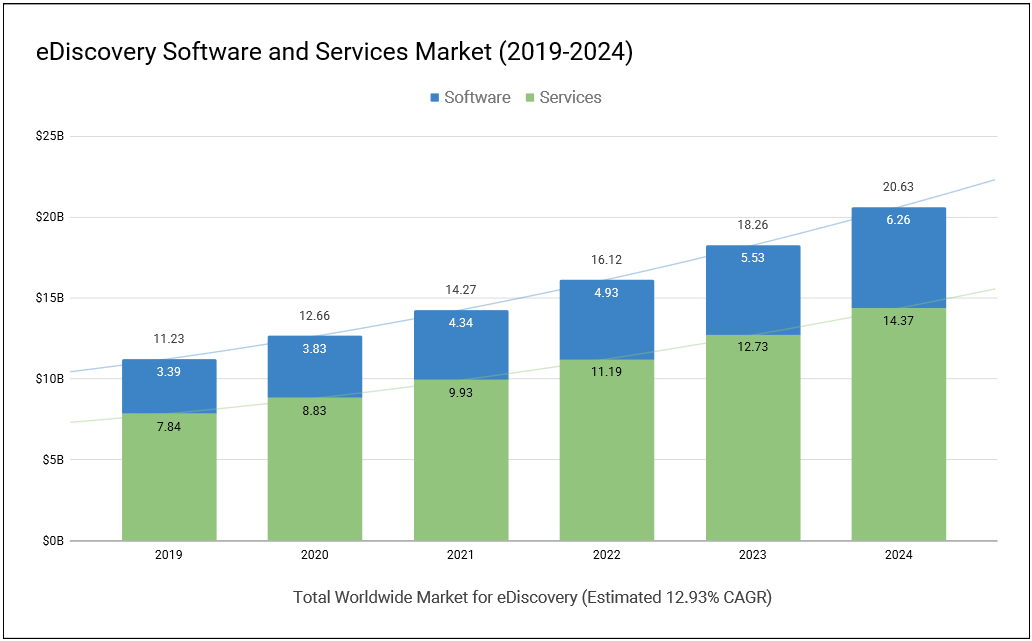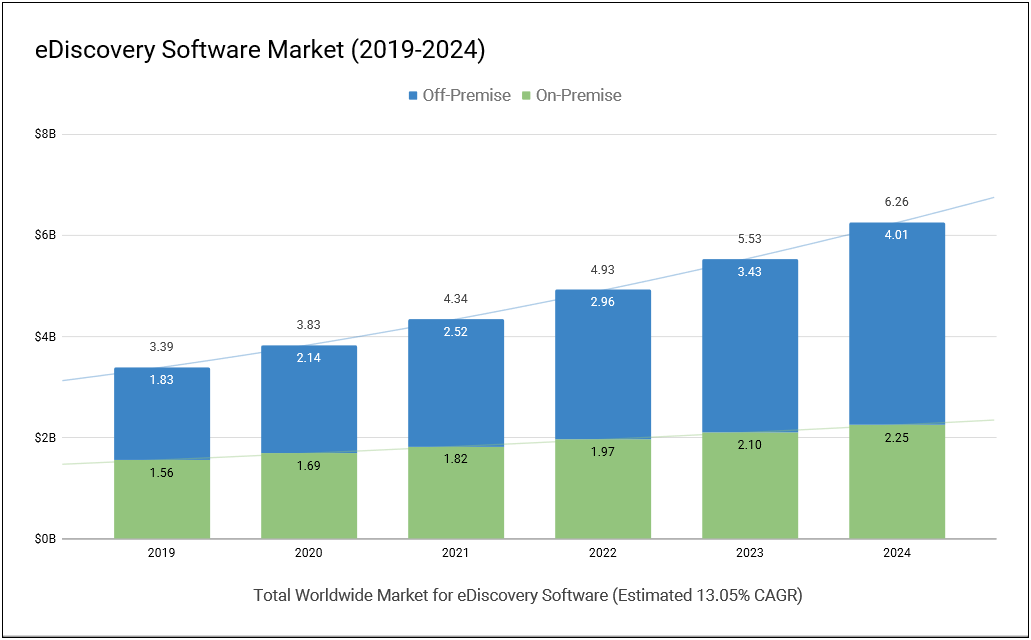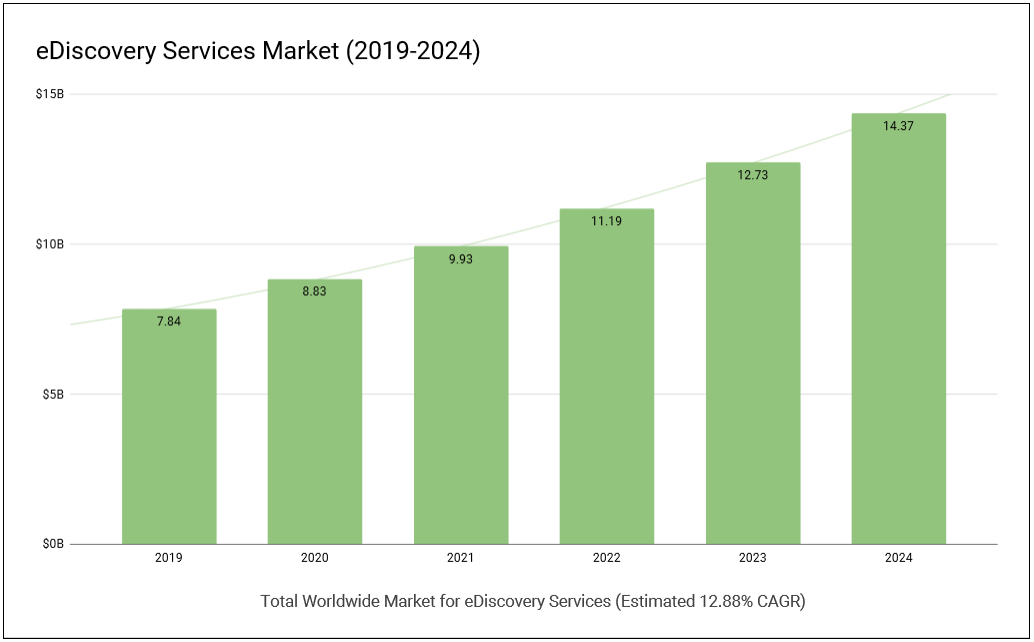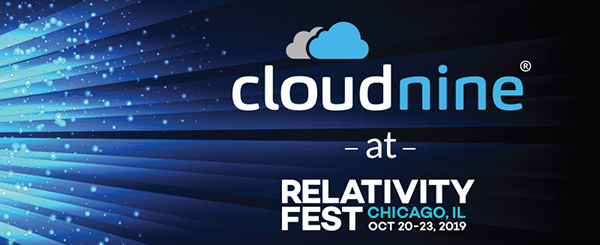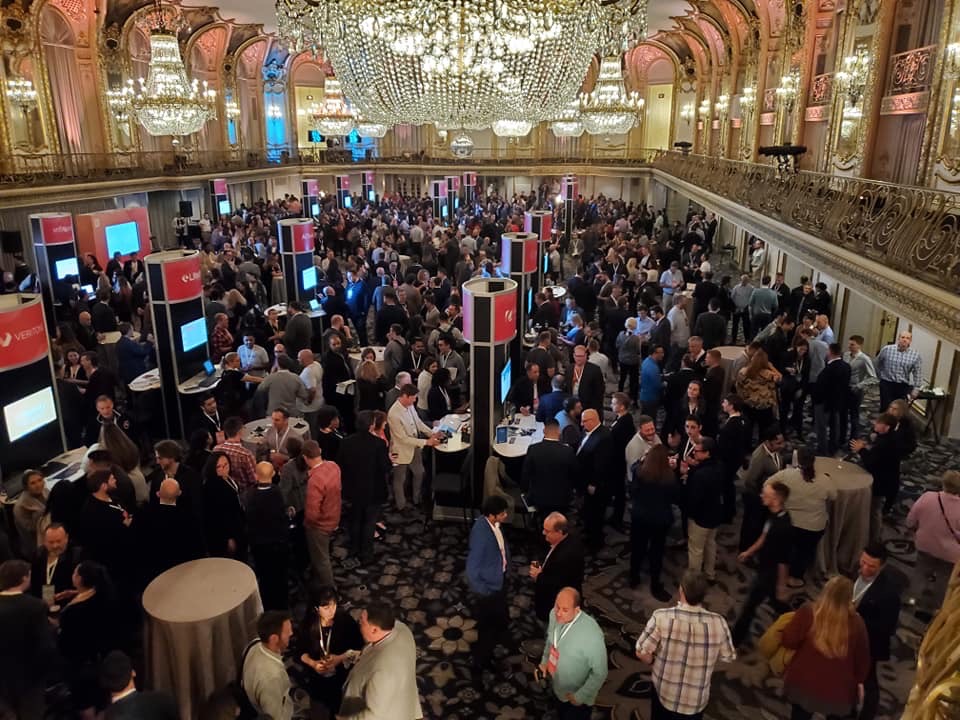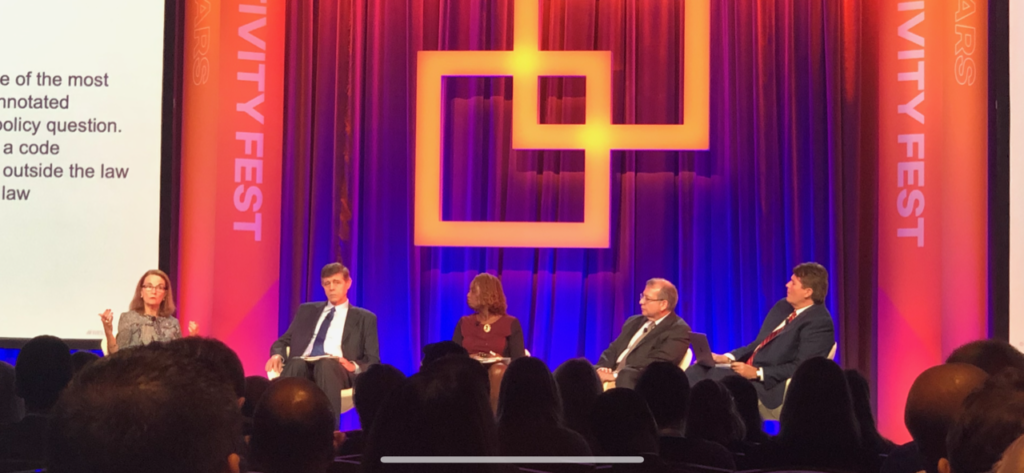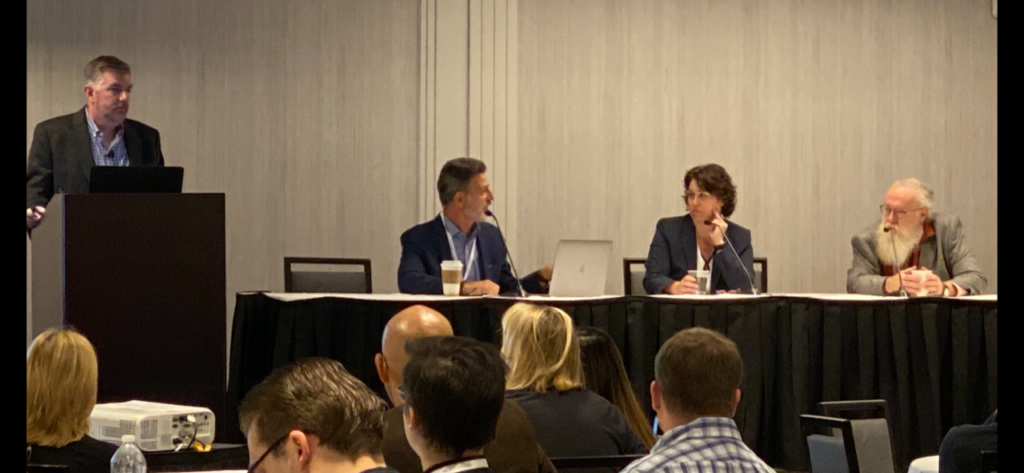As we noted yesterday, the 2019 Relativity Fest conference is going on this week, CloudNine is once again here as a Sponsor and Exhibitor and I will be covering the show for eDiscovery Daily. Let’s check out some of the sessions lined up for today (including the one I’m speaking at!).
This year, Relativity Fest is October 20 through October 23 in Chicago at The Hilton Chicago (a full three weeks later than last year). If you’re in the Chicago area, you can still make it for nearly all of the conference or attend on a one-day pass. As a development partner in the Relativity ecosystem, CloudNine will once again be the conference and will be there to provide demonstrations of our product interconnections with Relativity.
Here are some of the eDiscovery-related sessions for today:
8:30 AM – 9:30 AM:
Is It Time to Rethink the EDRM?
The EDRM has been a household name in the e-discovery and legal technology industry for 15 years. It has provided a framework for the development of software and services. In the increasingly non-linear and fast-moving legal technology world in which we now live and work, where cloud-based solutions, analytics, machine learning, and AI are impacting the data-driven decisions being made, is it time to rethink the EDRM? Join this lively and interactive session for a discussion about evolving standards and workflows in e-discovery and how they might be incorporated into a revised EDRM. This panel discussion will feature a speaker from the EDRM, a speaker from Relativity, and one or two industry leaders.
Speakers Include: Michael Quartararo – Managing Director, eDPM Advisory Services; Darcie Spruance – Senior Project Manager, Ms.; George Socha – Managing Director, BDO; Constantine Pappas – Senior Manager, Relativity Solutions, Relativity; Philip Favro – Consultant, Driven, Inc.
e-Discovery Disasters and How to Avoid Them: Don’t Let This Happen to You
e-Discovery mistakes and failures happen even at the largest organizations in the most high-profile situations—and this panel has proof. Join us to hear examples of failures by a major medical center, a major financial institution, a large federal government agency, and a noted presidential advisor. The panel will discuss the various issues that occurred in these high-profile cases and what to do to avoid them in your own cases.
This session has been submitted for CLE accreditation.
Speakers Include: Doug Austin – VP of Products/Services, CloudNine; Tom O’Connor – Director, Gulf Coast Legal Technology Center; Kelly Twigger – Principal, ESI Attorneys; Salvatore Mancuso – Vice President of Client Solutions, BlueStar Case Solutions, Inc.
Why Lawyers SHOULD Be Luddites
Modern parlance holds that the Luddites hated and feared technology—and thus that being a Luddite is bad. That’s incorrect. Luddites didn’t fear technology. They feared what it would bring: replacement of their professional skills and results by vastly cheaper (and poorer) labor. And in that, the Luddites were right. The incredible increases in the power of technology create incredible efficiencies. But technology also creates winners and losers. What can you do to be one of the winners?
Following up on last year’s “Will Artificial Intelligence Supplant the Practice of Law?,” this session will focus on the practical aspects of how lawyers (and those who work with them) can avoid being replaced by robots. How can you prevent your role from being replaced by the cheapest of labor? What can you do right now to improve your skillset and future-proof your livelihood? What tools are available in e-discovery, contract analytics, research, and other legal areas to improve your own efficiencies to the degree that you can stay relevant?
We’ll answer these questions and also look at the behind-the-scenes systems (client intake, timekeeping, invoicing, etc.) that eliminate the massive inefficiencies that destroy productivity for so many.
Speakers Include: Michael Simon – Principal, Seventh Samurai, LLC; Nicole Allen – Senior E-Discovery Attorney, Kilpatrick Townsend & Stockton LLP; Dan Linna – Director of Law and Technology Initiatives & Senior Lecturer, USA; Alvin Lindsay – Partner, Hogan Lovells.
The 2019 International Panel
This year’s International Panel will present legal perspectives from across the globe, updating you on the latest developments in cross-border e-discovery, conflict of laws, and data privacy and protection. Moderated by Chris Dale of the United Kingdom’s eDisclosure Information Project, the International Panel will go beyond the first year of Europe’s General Data Protection Regulation (GDPR) to examine data discovery issues facing practioners in South America and APAC as well.
This session has been submitted for CLE accreditation.
Speakers Include: Chris Dale – Founder, eDisclosure Information Project; Meribeth Banaschik – Partner / Forensics & Integrity Services, Ernst & Young GmbH; Kelly Friedman – National Counsel, Discovery Services, Borden Ladner Gervais LLP; Manfred Gabriel – Senior Counsel, Holland & Knight.
11:10 AM – 12:10 PM:
Data Subject Access Requests in the Americas and Beyond
Whether it’s an aggrieved employee, an unhappy customer, or someone who just wants to know how much information an organization has about her, data subject access requests (DSAR) have been a focus of Europe’s General Data Protection Regulation (GDPR). However, the provisions of the GDPR apply beyond Europe, and the GDPR isn’t the only game in town–laws such as the California Consumer Privacy Act (CCPA) have subject access request provisions creating compliance requirements in the Americas from Canada to Brazil. Join us for a session examining best practices for dealing with DSARs in the Americas and beyond.
This session has been submitted for CLE accreditation.
Speakers Include: David Horrigan – Discovery Counsel and Legal Education Director, Relativity; Ignatius Grande – Director, Berkeley Research Group; Ines Rubio – Head of Info Management and Incident Response, BSI; Rosemary Kuperberg – Assistant General Counsel & Data Privacy Officer, Ellucian; Meribeth Banaschik – Partner / Forensics & Integrity Services, Ernst & Young GmbH.
Secrets from Corporate Counsel: The Law Firm—Corporate Counsel Relationship
With changes in technology, data, and cyber treats, the corporate legal team’s needs and expectations are evolving, leaving law firms trying to keep up. Hear directly from corporate legal teams about what they want their outside law firms to know.
Find out:
- How they really feel about security?
- What innovation means to them?
- How law firms can provide more valuable services?
- What most law firms are overlooking?
- Why they dismiss law firms?
Speakers Include: Constantine Pappas – Senior Manager, Relativity Solutions, Relativity; Karen Wagshul – eDiscovery Counsel, Allstate; Kimberly Quan – Lead, eDiscovery & Information Governance, Juniper Networks; Beth Solomon – Director & Senior Counsel, Payments, Discover Financial Services.
11:10 AM – 1:00 PM:
Women in e-Discovery Luncheon: Stellar Women in e-Discovery Panel
Joy Murao, founder of Practice Aligned Resources, will moderate a panel featuring this year’s three finalists, Stephanie Clerkin of Korein Tillery, Lisa Waldin of Ryley Carlock & Applewhite and Debora Motyka-Jones of Lighthouse, for the Stellar Women in e-Discovery Innovation Award.
As the first-ever Stellar Women in e-Discovery Innovation Award winner, Joy will lead the discussion as the panel shares their thoughts on the importance of mentorship and how the e-discovery community can elevate emerging leaders in the field.
Speakers Include: Joy Murao – CEO, Practice Aligned Resources; Lisa Waldin, Esq. – Project Manager, Ryley Carlock & Applewhite; Stephanie Clerkin – Director of Litigation Support, Korein Tillery.
1:25 PM – 2:25 PM:
Defending IP and Trade Secrets: How to Shape Positive Outcomes with e-Discovery
Even in the most clear-cut matters, defending IP and trade secrets can be difficult. And when digital evidence is obfuscated through direct and indirect efforts, these defenses can be downright daunting. However, with a comprehensive and integrated discovery plan supported by a team of experts with digital investigative experience augmented with targeted e-discovery technologies, legal teams can quickly, effectively, and economically gain and maintain the legal high ground in these critical corporate matters.
This expert panel will present actionable approaches and best practices for counsel to consider as part of forensic collection, early case insight, and legal document review efforts during IP and trade secret matters. Shared through the lens of an example matter based on an aggregate of actual experiences, this panel presentation will help legal teams as they seek to proactively shape positive e-discovery outcomes.
Join us to hear discussion on the following topics:
- Organizing for Success: From Complaint to Discovery Plan
- Accelerated Execution: Translating Data into Evidence
- Advancing on Smoking Guns: Advanced Technologies and Assisted Review
- Reviewing Right: Accelerated Legal Document Review
- Decisive Differences: The Benefit of an Integrated e-Discovery Provider
Speakers Include: John Wilson – CISO, HaystackID, LLC; Steven Pacini – Attorney, Latham & Watkins LLP; Michael Sarlo – Partner & Co-Founder & EVP – eDiscovery and Digital Forensics, HaystackID; Nathanial McPherson – Associate (Intellectual Property Litigation), Latham & Watkins LLP.
Mobile Data Best Practices: Legal, Business, and Security Considerations
Mobile data have become arguably the most important source of information in litigation, investigations, and just about every form of data discovery. Have we lost the battles over data privacy and data protection with our data exposed for all to see? Is more evidence a bad thing? Has consolidation in the world of e-discovery and mobile forensic technology affected innovation? Are state-of-the-art forensic tools out of reach for many legal teams? Join us for a lively conversation as leading authorities in legal forensics and mobile technology discuss and debate the vital mobile data issues of the day.
This session has been submitted for CLE accreditation.
Speakers Include: David Horrigan – Discovery Counsel and Legal Education Director, Relativity; Greg Buckles – eDiscovery Research Consultant, The eDJ Group Inc.; Craig Ball – Attorney, Forensic Technologist, and Adjunct Professor, University of Texas; Shahaf Rozanski – Head of Cellebrite Business Solutions, Cellebrite.
New Cross-Border & Privacy Concerns in the Age of GDPR Fines
GDPR fines are no longer hypothetical possibilities but reality for global organizations. The 72-hour notification requirements within GDPR, as well as an increased focus on cross-border data transfers, places new burdens for legal teams to safely and defensibly handle personal information. Attend this session to learn how leading legal teams are meeting these challenges, and designing workflow that complement features within Relativity.
Speakers Include: Wendy King – Sr. Managing Director, FTI; Clair Atkins – Team Lead, Customer Experience, RelativityOne, Relativity; Rose Jones – Partner / Dir. E-Discovery PM & Tech, King & Spalding; Nick Newbury – Director Technology, FTI Consulting.
The Long and Winding Road: Career Paths in e-Discovery
On the premise that an unexamined e-discovery life is not worth living, this panel will feature women who work at various types of companies, in various roles, within the e-discovery field. From law firm, to corporation, to service provider, to government, and beyond.
This panel will explore the tough questions…
- How on earth did we get here?
- Why e-discovery?
- What makes for a good first job in e-discovery?
- Are certain types of companies easier to break into than others?
- What are the advantages/disadvantages of working at a corporation, law firm, service provider, etc.?
- Which type of company do you feel is the most stable, which is the most innovative, and which pays the most?
- If you could do your career over again, what would you change?
Join us for fun, upbeat discussion. Whether you’re new to e-discovery, at a crossroads in your career path, or just want to hear some good stories, this session is for you.
Speakers Include: Cristin Traylor – Counsel, McGuireWoods LLP; Melissa Sanborn – Senior Customer Success Manager, Relativity; Debbie Beeler – Senior Paralegal-Major Litigation, T-Mobile; Tamara Loveland – Electronic Evidence Specialist, US DOJ.
2:45 PM – 3:45 PM:
Talk Discovery to Me: How to Conduct Effective Interviews with IT and Custodians
The best technology and workflows are of little value if you don’t have the right data in a usable format. Failing to preserve, bad data collections, or abnormal data storage can sabotage your collection and review of potentially relevant data. A key to avoiding these potential saboteurs is conducting effective interviews with your client’s IT administrators and custodians. Done well, these interviews can help you identify and properly preserve the relevant data sources, address potential challenges, and ensure that you have the right processes and the right technology solutions from the outset. If the interviews are done poorly, however, it can create hurdles throughout the entire discovery process. Based on their years of experience in the industry, the panelists will provide examples of good and bad interview techniques, discuss challenges they have encountered or avoided in the past, and present ideas that you can take into your next interview.
Speakers Include: Erica Noel – Discovery Counsel, McDermott Will & Emery; Alex Godofsky – Discovery Consultant, McDermott Will & Emery; Tim Gleason – Discovery Counsel, McDermott Will & Emery.
DSAResolution: A Lawyer-Led Development of a Business Proposition
Join this session to learn all about the ins and outs of DSAResolution—a lawyer-led initiative that harnesses technology to address data subject access requests (DSARs).
According to the Information Commissioner’s Office (ICO), the number of data subject access requests has more than doubled since 2016, with 9,090 recorded from May 25 to December 11, 2018. Employee DSARs are a huge headache for multinationals. They want them dealt with as efficiently and cheaply as possible, while still meeting their obligations to the ICO and the requester.
DSAResolution was born from a desire to build the most cost-effective workflow possible. In this session, we’ll discuss the challenges of creating a tailored software environment that supports lawyers at a price that is attractive to clients. You’ll learn how we built a customized Relativity DSAR environment that supports everything we need to do, and nothing more—ensuring significant savings for clients.
Speakers Include: Benjamin Craghead – Head of UK Client Experience, Consilio Self-Service, Consilio.
The Future of Legal Service Delivery: Interoperable Apps and Services
Technology is increasing the potential for what it means to deliver legal services every day. The proliferation of devices that produce data means that there is greater opportunity for understanding how previously untapped areas of the market interact with one another. The vastness of this data now means that even seemingly discounted pieces of information can be aggregated to great effect. For example, the comments from Yelp reviews can be used to more accurately predict which restaurants will have health code violations, and your interactions on social media can be used to help more accurately predict where crowds will form, emerging fashion trends, or even the spread of contagious disease.
This same potential exists in the legal industry. Last January, during the 2019 MIT Computational Law Course, one of the standout modules of the course focused on how information could be atomized, standardized, and configured to yield more dynamic possibilities beyond e-discovery. This session will provide an overview on the value of data and the ways that data might be used to push the limits of what people currently imagine as possible, discuss the strategies for building interoperable legal apps and services, and look at how this nascent technology could be optimized for future use cases.
Speakers Include: Bryan Wilson – Legal Hacker; Dazza Greenwood, MIT.
State of the e-Discovery Union: The Roundtable on the Industry and the Profession
The latest gathering of the State of the e-Discovery Union Roundtable will focus on 2019’s developments affecting the industry and the profession–your company, your job, and your future career. We’ll examine the job market, industry growth, legal education, technological competence, continuing education, access to justice, and more. We’ll continue the Roundtable’s tradition of a game format with members of the Roundtable playing for charitable or educational organizations, and we’re honored to have the Honorable James Francis IV and the Honorable Andrew Peck serving as judges.
Speakers Include: David Horrigan – Discovery Counsel and Legal Education Director, Relativity; Hon. Andrew J. Peck – Senior Counsel, DLA Piper; Ari Kaplan – Principal, Ari Kaplan Advisors; Zach Warren – Editor-in-Chief, Legaltech News; Ryan O’Leary – Senior Research Analyst, IDC; Kelly Twigger – Principal, ESI Attorneys; Meribeth Banaschik – Partner / Forensics & Integrity Services, Ernst & Young GmbH; Hon. James C. Francis IV – Distinguished Lecturer, City University of New York School of Law; Mary Mack – CLO, MaryMack.com.
Data Security in a Data Proliferating World
As the debate around data security and its effectiveness ebbs and flows from cloud to on-premises e-discovery deployments, executives across leading global organizations are being asked to take a stance on “where their e-discovery data will be most secure while balancing cost and efficiency.”
This panel will dive into the differing views on data security effectiveness across platforms and the varying controls, policies, and processes that have proven successful. Our panelists will introduce the specific security mandates being pioneered both internally (at law firms and enterprises) and externally (solution providers) in order to be security leading rather than lagging. They’ll also give a point of view on how security expectations in the e-discovery industry will continue to evolve over the next 12-18 months.
Speakers Include: Jordan McQuown – Vice President of Technology, Georgejon; Josh Zylbershlag – E-Discovery Litigation Services Director, Paul, Weiss, Rifkind, Wharton & Garrison LLP; Adam Connor – Producer, Risk Placement Services; Joe Moberly – Director of eDSM & Engineer Dev, George Jon; Jamie LaFramboise – Director of Application Engineering, George Jon; Gregory Spicer – CRO, Braintrace; John Wilson – CISO, HaystackID, LLC.
4:05 PM – 5:05 PM:
Preservation and Collection Strategies to Minimize Costs
e-Discovery costs are minimized when non-relevant materials are eliminated as early as possible from the process. Preventing non-relevant materials from even being collected saves the most money because these documents are not processed, hosted, reviewed or produced. However, aggressively limiting what’s collected to save costs can backfire if the requirements of a project shift enough to require recollection. If the data was not preserved, it could even result in spoliation sanctions.
In this session, we’ll discuss how to balance the risks and benefits of culling data in a collection, including:
- When and how to limit the data collected
- What situations capturing entire accounts or imaging devices is appropriate
- When to make preservation images and the scope of those images
- How to leverage a client’s existing backup and preservation processes
- How to take advantage of electronic legal holds
Speakers Include: Andrew Hansell – Senior E-Discovery Consulting Manager, Faegre Baker Daniels; Marc Zamsky – Chief Operating Officer, Compliance Discovery Solutions; Lisa Davis George – Director and Senior Counsel, Discover Financial Services; John Sellner – E-Discovery Counsel, Winthrop & Weinstine, P.A.
Mastering the Challenges of Mobile Forensics in e-Discovery
As the usage of smart phones and mobile devices continues to increase exponentially their important role in litigation cannot be overlooked. Mobile devices present unique challenges in finding the right data that is responsive to discovery requests. Having the skills and training to uncover deleted files and messages while preserving and restoring data is now required in every investigation.
You will learn:
- Management of devices and how e-discovery may vary because of consent
- Tips for conducting effective e-discovery on mobile devices
- Best practices and techniques in the use of UFED, Physical Analyzer and Cloud Analyzer
Speakers Include: Eric Olson – Solutions Engineer, Cellebrite Business Solutions, Cellebrite; Shahaf Rozanski – Head of Cellebrite Business Solutions, Cellebrite.
Translating Tech for Non-Technical Attorneys
Tools like active learning and concept searching can have a big impact on a case, but getting buy-in from attorneys isn’t always easy—especially when they’re unfamiliar with the tech. In this session, we’ll focus on ways for you to translate the merits of the more abstract aspects of e-discovery into easy-to-understand scenarios for attorneys and others who are unfamiliar with the technical side of things. Join us to learn how to translate concepts like active learning, email threading, conceptual searching, regular expressions, and custom indexes into easy-to-explain scenarios that allow for attorneys without technical or e-discovery expertise to understand and approve for use in matters.
Speakers Include: Amber Whipkey – Senior Staff Attorney, WilmerHale; Kelly Davidson – Senior Litigation Support Coordinator, WilmerHale.
Women in eDiscovery Presents: Show Me the Money
Women are still underpaid compared to men — 79 cents to the dollar according to some studies. Some experts attribute the pay gap in part to the fact that women are less comfortable negotiating with their employers and prospective employers. In this session, our panelists will provide practical talking points and tools to prepare for and conduct effective employment negotiations. Join us to discuss the questions and answers below:
- The first party to propose a salary figure generally loses. How do you avoid that?
- How do I know if I’m making or requesting the right salary level for my job description?
- What are some tips for drafting an effective salary negotiation email?
- What is the best medium for salary negotiation?
- Whether and how to show your enthusiasm during salary negotiation?
- What is the best way to conclude the negotiation?:
Speakers Include: Deborah Temkin – Director, The BERO Group; Krista Brookman – Vice President, Catalyst; Megan Lopp Mathias, Lopp Mathias Law; Carolyn Aberman – Managing Partner, Lucas Group.
To register to attend Relativity Fest, click here. It’s not too late! And, Go Astros! ;o)
So, what do you think? Are you attending Relativity Fest this year? Please share any comments you might have or if you’d like to know more about a particular topic.

Sponsor: This blog is sponsored by CloudNine, which is a data and legal discovery technology company with proven expertise in simplifying and automating the discovery of data for audits, investigations, and litigation. Used by legal and business customers worldwide including more than 50 of the top 250 Am Law firms and many of the world’s leading corporations, CloudNine’s eDiscovery automation software and services help customers gain insight and intelligence on electronic data.
Disclaimer: The views represented herein are exclusively the views of the author, and do not necessarily represent the views held by CloudNine. eDiscovery Daily is made available by CloudNine solely for educational purposes to provide general information about general eDiscovery principles and not to provide specific legal advice applicable to any particular circumstance. eDiscovery Daily should not be used as a substitute for competent legal advice from a lawyer you have retained and who has agreed to represent you.
